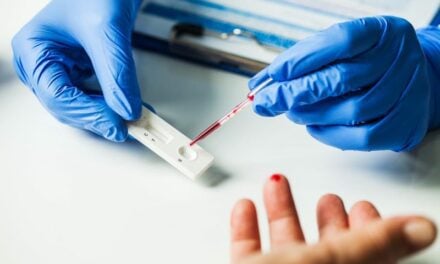San Diego-based iAssay Inc, a privately held company developing the world’s first open-platform, point-of-care (POC) reader for remote medical diagnostics, recently announced that the United States Patent and Trademark Office has issued a notice of allowance for its US Patent Application 13/074,209.
The allowed patent application includes 66 claims relating to multiple types of patient tests, wireless communications, plug-in modules, and user guides. The patent is expected to issue in mid 2019, providing patent protection into 2035.
The iAssay system is the world’s first open platform for wirelessly connected POC diagnostics. The system replaces the functionality of a variety of single-function readers with a single handheld device and plug-in units that adapt nearly any POC test cartridge to the iAssay system. The HIPAA-compliant device aggregates patient biometric data from tests and wearable monitors, and transfers the data to Cloud servers.
The iAssay system eliminates trips to deliver blood samples to central labs by testing patients wherever they are. Testing at a clinic or at the patient’s bedside eliminates test result delays (and delayed diagnosis), minimizes sample handling and transportation costs, improves patient outcomes, and saves the healthcare system money.
“There is a significant unmet need in healthcare today for a single device at the point of care that has the capability to operate multiple different assay modules,” says Lonnie Adelman, founder and CEO of iAssay. “The development of the iAssay universal handheld diagnostic system has the potential to significantly reduce healthcare costs, simplify care providers’ workflow, and ultimately improve patient care.”
The newly allowed patent claims cover the functionality that enables care providers to perform multiple types of assays simultaneously by adapting POC test cartridges of various formats and technologies to the iAssay device.
Claims also cover device wireless communications and plug-in modules that expand the hardware and processing capabilities of the handheld unit. Further, claims cover the capability to guide the care provider during sample collection and processing, including the ability to decide whether to continue a test or perform certain steps of a test based on interim results as the test progresses.
“This notice of allowance strengthens the value of our pipeline with near-term intellectual property protection and highlights iAssay’s innovation in proprietary, multiuse diagnostics for point-of-care testing,” says Adelman. “We are excited to be one step closer to bringing this groundbreaking innovation to caregivers.”
For further information, visit iAssay.
Featured image: The iAssay system and modules, by iAssay.






